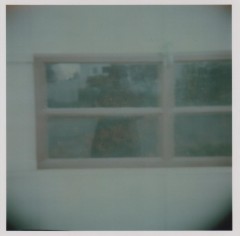Fiction Piper Daniels — March 5, 2013 12:48 — 0 Comments
The Ruins – Piper Daniels
There were things neighbors wouldn’t notice about the two-story cedar on Pierce Street. Things beyond the bright teal door, garlanded by evergreens and, in the spring, deep purple impatiens (also known as touch-me-nots) peeking shyly from beds of mulch. Â
Several years ago, the father acquired the house and remodeled it with his bare hands, digging up and disrupting native soil in order to superimpose new architecture over the ghosted frame of the old. In gray November, the girls rode bicycles from their childhood home to the mouth of this new, temporarily deserted kingdom. The father traced cedar beams with his fingertips to illustrate what their bedrooms would be like, and the girls would lie back in the uninstalled porcelain tub, pretending to be shipwrecked. When at last the house was complete, all historical artifacts were relegated to the basement, which had not been renovated, where it was sinister and smelled overwhelmingly of turpentine.
There was the mother’s motorcycle, the one she’d used to haunt Woodward Avenue with a bottle of Southern Comfort tucked between her legs. And the father’s punching bags, still smeared with knuckle blood. There were boxes of Barbie dolls, most of which had been shorn, burnt and dismembered, and the real life dresses the girls had worn to Sunday service, when they were still mommy’s matching dollies.
Perhaps most upsetting was the enormous pile of family photographs which, through exposure to moisture, black mold, earwigs, and voles had congealed to form a single sticky patchwork of neglect. When at last the father attempted to rescue the photographs from an old trunk, he lifted the lid and found dozens of writhing opossum babies using them to nest.
Outwardly, the remodel was a fine house, one of the last with character among the town’s recent swell of McMansions, but it wasn’t enough to save them. No sooner was it finished than the mother and father began to disappear. It was as though their former lives locked so tightly in the basement had risen through the first and second stories like steam. They began staggering home late at night, soaked in Camel Reds and Glenlivet, until finally, they stopped coming home altogether, and the girls learned in loaded silence not to listen for the turning of the key.
In many ways, the house came to resemble a demilitarized zone. After the opossum babies, the door to the basement had been welded shut, and the girls were never to enter the master suite, where red silk negligees hung loosely like mother’s doubles from the walk-in closet. For the most part the girls, who were learning what it was to be deserted, kept to their rooms, and slept with knives beneath their pillows, and prayed to their parents’ God that no stranger would come for them in the night.
As little girls they had loved the Pippi Longstocking movies, inspired by the girl with superhuman strength who lived alone in Villa Villekulla without the supervision of Ephraim, her sea captain father. But soaking in the loneliness of their parentless household, ages 9 and 12, they began to wonder if the movies hadn’t been some sort of grooming tool for the abandonment to come.
Who knows where the parents had gone. They’d stopped filling the refrigerator, signing report cards, appearing at after-school events. Still, certain things were deep-seated: the girls were expected to excel. They were not to eat sweets, or say the Lord’s name in vain, or have boys within 100 feet of the house. For a season, these rules were observed with the blind allegiance young girls have for dear mom and dad. But as the girls grew, so too did their rage over being abandoned. They transgressed upon their mother’s closet, hurling her snakeskin stilettos at one another, tallying their contusions in order to determine which girl was the weaker.
When at last they grew tired of sisterly war, the girls invited guests to their afternoons of mutiny. It was not uncommon for classmates and neighborhood playmates to dress in the father’s best Sunday suits and take turns smashing bottles of his expensive single malt scotch. Or to coat the mother’s Linda Ronstadt records in peanut butter and throw them for Flash, the neighborhood stray.  By tearing down the father’s house, starting from the inside, they would make it their own; transform it into something so unrecognizable that the parents wouldn’t be able (if ever they tried) to find their way back.
What the girls were too young to realize: there’s more to autonomy than the guarantee of freedom. It had never been suggested, in all of Pippi Longstocking, that Pippi’s sovereignty would come at the cost of her innocence, nor had it been implied that Ephraim’s absence would create an opening for the worst of the daughter prowlers to worm through.
It was something the girls learned the hard way, first the oldest and, by exposure, the youngest—the way neighborhood boys were drawn like poisonous insects out of the cold when they learned of this warm, unguarded opening. Unable to protect themselves, the girls would curl up in the hall closet and remember—when the house was new and shot through with pale November light—the father’s fingers tracing rooms between beams.
And in the end, after she’d become accustomed to the bruises intruders made, the older girl became more susceptible than ever to the house’s atmosphere. She would close her eyes and vibrate, like a lightning rod, with its fearsome energy. She could no longer sleep beneath the pink canopy of her childhood bed, any more than she could face the world outside those wide bay windows. So she took to the roof, slept as a shingle under the starlight, and dreamed up ways of burning the house to the ground so at the very least the mother and father would know, once and for all, that this is what had become of them.
The answer isn't poetry, but rather language
- Richard Kenney



